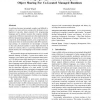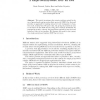45 search results - page 1 / 9 » Transparent Runtime Randomization for Security |
109
click to vote
SRDS
2003
IEEE
15 years 7 months ago
2003
IEEE
A large class of security attacks exploit software implementation vulnerabilities such as unchecked buffers. This paper proposes Transparent Runtime Randomization (TRR), a general...
124
click to vote
OOPSLA
2010
Springer
15 years 14 days ago
2010
Springer
As software becomes increasingly complex and difficult to analyze, it is more and more common for developers to use high-level, type-safe, object-oriented (OO) programming langua...
115
click to vote
REFLECTION
2001
Springer
15 years 6 months ago
2001
Springer
This article investigates the security problems raised by the use of proxy-based runtime meta-object protocols (MOPs) for Java and provides an approach for making meta-level code t...
115
click to vote
IWSEC
2007
Springer
15 years 8 months ago
2007
Springer
The problem of defending software against tampering by a malicious host is not expected to be solved soon. Rather than trying to defend against the first attack, randomization tri...
105
click to vote
NSPW
2003
ACM
15 years 7 months ago
2003
ACM
The ability to analyze and modify binaries is often very useful from a security viewpoint. Security operations one would like to perform on binaries include the ability to extract...


